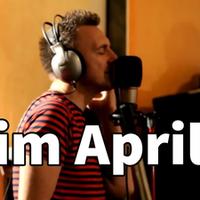Tag im April
Du musstest gehen, zu früh gehen,
Keine Zeit, um zu verstehen.
Die Welt blieb stehen, einfach stehen,
Sie hörte auf sich zu drehen.
Es wurde still, unheimlich still
An diesem Tag im April.
Wir mussten sehen, hilflos sehen,
Wie dein Leben vergeht, du von uns gehst.
Refrain:
Ich hoffe, die Zeit heilt die Wunden,
Bin tief im Schmerz versunken.
Gedanken kreisen, du musstest leiden
Und keiner weiß, warum.
Ich habe den Schmerz ertrunken
In den schlimmsten Stunden.
Stärke zeigen and deiner Seite,
Die Gefühle bleiben stumm.
Es tut weh, unendlich weh,
Wir konnten uns nicht mehr sehen.
Ich kann dich spüren, du bist bei mir,
Wir werden uns niemals verlieren.
Es wurde still, unheimlich still
An diesem Tag im April.
Wir mussten sehen, hilflos sehen,
Wie dein Leben vergeht, du von uns gehst.

